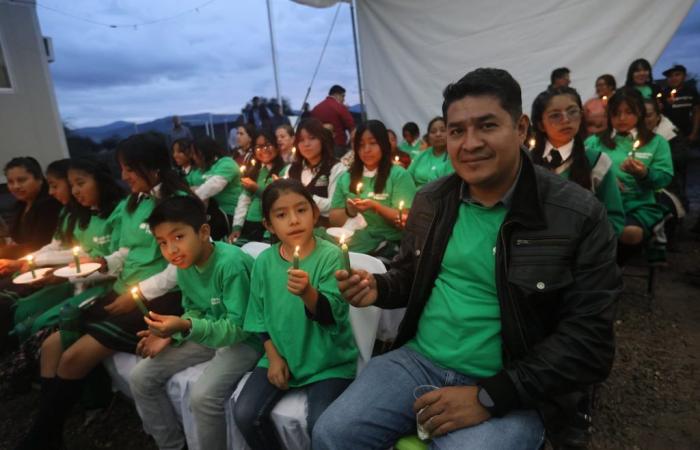Public education in Mexico faces problems such as the shortage of basic services, the insecurity of some areas or the absence of teaching tools, among many other aspects that impact poor performance and eventual school dropout of students. The lack of electricity reflects the existing deficiencies in some educational centers. According to data from the National Commission for the Continuous Improvement of Education, more than 26,000 compulsory education schools in Mexico lacked electricity in the 2021-2022 school year.
When Andrea Avendaño Vargas, a student at Telebachillerato Comunitario No. 62 in the community of San José Monte Chiquito, in the Puebla municipality of Santiago Miahuatlán, finished high school, she found herself at a crossroads. Her family and economic situation prevented her from taking the distance learning option during COVID-19 and she had to abandon her studies. And when the lockdown ended and she was able to return to school, other barriers awaited her. In large part, due to the total absence of a basic service at school: electricity.
“They told me that this telebaccalaureate was a place with many needs, that learning was scarce and I also felt insecure. In high school I had twelve teachers and when I came here there were only three,” explains the young student from this educational center that, located in an isolated area of San José Monte Chiquito, is made up of several mobile classrooms.
One of Andrea’s three teachers, teacher Patricia Alcántara Romero, tells how the community’s effort to have electricity at the Telebachillerato, located on land donated by the local government three years ago, was almost a lost battle, until the day who received an unexpected visit.
“From the beginning we had many needs, one of them was the lack of electricity. Even the neighbors cooperated to put up some posts, but it was very expensive. We had almost given up when a representative from Iberdrola México visited us in the middle of last year [2023] and asked us if we had electricity.”
Three months after that visit, Iberdrola Mexico’s Luces de Esperanza program installed six solar panels at Telebachillerato Comunitario 62, changing its dynamics and reality since October of last year.
Today, Andrea Avendaño is studying the last days of the sixth and last semester of high school, with a promising horizon thanks to the presence of electrical energy from clean and sustainable sources, something that just a few months ago seemed unattainable.
“Now we can connect a projector, a laptop or audio. All subjects began to be more interesting. Now I feel happier because I can appreciate things in a different way, I feel that my learning has improved,” confesses Andrea, who plans to study foreign languages and, later, Finance, at a university near her home, in the city of Tehuacán. also in Puebla.
Sustainable lighting
Since its start in 2019 to date, Luces de Esperanza has impacted the quality of life of nearly 7,300 people throughout the country, through the electrification of homes and community spaces such as hospitals and schools in rural areas far from the capital. municipal, without access to conventional electrical service, and that are located in entities where Iberdrola México has a presence.
Within the framework of its first phase in Puebla, the Lights of Hope program has benefited 81 homes and 12 schools, always aligned with local authorities and state governments.
For Erika Fernández, coordinator of the Iberdrola México Foundation, Luces de Esperanza transcends the mere donation and installation of solar systems, by improving the quality of life of people in areas such as education, health, work or security.
“Iberdrola Mexico grows hand in hand with the communities where it operates, with quality jobs and social products. We are in direct contact with the beneficiaries and, through our technical allies, we maintain the equipment in case of any failure that may occur. Additionally, we carry out workshops with the civil association ConcentrArte to inform both students and the community in general about the importance of renewable energies. We always work in coordination with the authorities. We are convinced that the sum of efforts generates better results,” Fernández explains.
“Currently, this school has an energy service that offers 12 kWh per day through six solar panels, each of 330 watts, as well as storage composed of 6 batteries that can provide up to 35% storage for nighttime use,” explains José David Peñaloza, manager of strategic alliances at Ilumexico, a company that collaborates at a technical level in the implementation of Luces de Esperanza.
The installation benefits a population of 90 students and the teaching staff, and was carried out based on the survey and prior evaluation of the consumption recorded in the school, as well as its potential growth.
In addition to lighting the facilities, this educational institution can now charge cell phones, connect projectors, computers, speakers and other tools, providing a comprehensive service for the entire student community.
Teacher Patricia Alcántara highlights that the support of Luces de Esperanza from Iberdrola México does not generate any costs for them, which allows them to redirect economic resources and fees toward other school needs such as new equipment and teaching materials.
In addition, thanks to Luces de Esperanza, today the Community Telebachillerato number 62 has a second shift, allowing the educational offer to be expanded and thus continue promoting the talent of the youngest.






